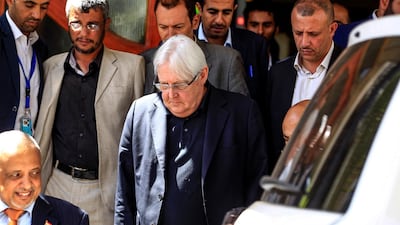Martin Griffiths, the UN Secretary General's special envoy for Yemen, told the Security Council on Wednesday that Houthi rebels had withdrawn from the ports of Hodeidah, Al Saleef and Ras Isa.
The UN had been monitoring the pull-out on the coast for four days. It is the first step of a process agreed to in December as part of a ceasefire in the Red Sea ports, which has been repeatedly delayed by a lack of trust between the rebels and the government.
Last year's truce was the first move in UN-brokered efforts to end fighting and move towards a political solution, but the government was angry over the manner in which the rebels' withdrawal occurred.
Houthi fighters may simply have changed out of military uniform and into coastguard dress, officials said.
Mr Griffiths, however, called the withdrawal a concrete step that presented an opportunity to return to talks, although fighting elsewhere, especially a drone attack on a pipeline in Saudi Arabia, threatened to derail such efforts.
Hodeidah is the main entry point for Yemen's imports and aid, and a source of revenue for the Iran-backed rebels.
The Arab Coalition led by Saudi Arabia and the UAE, which has backed Yemen's internationally recognised government in the conflict since 2015, says the Houthis' control of the ports allowed weapons to be smuggled in from countries including Iran.
Peace talks six months ago in Sweden led to the ceasefire agreement for Hodeidah.
“The military forces of Ansar Allah have now left the three ports,” Mr Griffiths said, referring to the Houthis. “This will allow the UN to play a leading role in supporting the Yemen Red Sea ports in management and inspections at the ports.”
Although the Houthis have pulled out of the ports and immediate surrounds, the UN has not yet brokered a deal on phase two of the limited ceasefire – which local forces will take control of Hodeidah. Yemeni troops remain on Hodeidah’s outskirts.
The ceasefire does not apply to the rest of Yemen.
“We were never expecting the implementation of this agreement to be easy,” Mr Griffiths said.
“We are pursuing an agreement with the parties on an approach to the issue of local security forces in parallel with negotiations on redeployments."
Yemen's ambassador to the UN said the government reserved the right to verify the withdrawal.
Lt Gen Michael Lollesgaard, who leads the UN mission in Hodeidah, is handling the local negotiations between Houthi and government representatives.
Gen Lollesgaard, speaking from the city late on Wednesday, said that after months of talks the Houthis' pullout was necessary to speed up humanitarian aid operations at the ports, which have been damaged during the war and will require repair.
He conceded that Yemen's government believed the pullout had been unfair but said the ports were now demilitarised as fighters were no longer in trenches or tunnels and remaining signs of military occupation would be removed.
“We needed this approach. Had we not done this we would still be negotiating,” Gen Lollesgaard said. “Now we are doing a lot better.
"This will have to be verified in a genuine, proper and transparent manner at the end of phase two.
“It was not foreseen to approve vetting of the coastguard in phase one. I knew, everybody knew, also the government knew that there might be non-coastguard Houthis among the guys going around in their uniforms in the ports in the first phase.
"But even if the government had participated and we had done the full phase one, we would not have done a full vetting of the coastguard personnel.”
Gen Lollesgaard confirmed The National's exclusive report that he has barely one fifth of the 75 monitors that the council approved in January for the Hodeidah mission>
He said there were 15 to 18 observers, depending on rotations, and that 30 more were awaiting visa approval.
“We have some on leave and some coming in," Gen Lollesgaard said. "I need the additional 30 people. It is quite urgent that the Houthi side get the approval of these visas."
Regardless of the tentative progress in Hodeidah, the war rages elsewhere.
Mr Griffiths said earlier that Yemen's government had assured him of its commitment to a UN-led peace process.
But the Houthis' attack on the Saudi Aramco pipeline, using seven explosive drones, and other violence, showed that Yemen was at a crossroads between war and peace.
“Events like this are a reminder that hard won achievements can be wiped away very easily,” Mr Griffiths said.
Saudi Arabia has responded to the attack by urging the Security Council to enforce resolutions aimed at disarming the Houthis, saying they had used the port of Hodeidah as a “launch pad for terrorist operations”.
A letter sent to the council on Tuesday said seven explosive drones attacked the Saudi facilities.
“While the Houthi militia claims full responsibility and calls it a victory, such an act will only lead to further escalation in the region,” read the letter, which was circulated to the council before Mr Griffiths’ briefing.
More progress is needed to bring the parties closer to a negotiated end to the conflict.
“It has been three years since the parties discussed politics," the UN envoy said. "It's about time.”
Britain's permanent representative to the UN, Karen Pierce, said Mr Griffiths' briefing to the council was “both uplifting and horrifying”.
“We condemn this attack by the Houthis,” Ms Pierce said of the drone incident.
The council also heard from Mark Lowcock, the UN's emergency relief co-ordinator, who said the “spectre of famine still looms” in Yemen, and that cholera had already affected 300,000 people this year, compared to 370,000 in all of 2018.
And Henrietta Fore, Unicef's executive director, said the war was affecting children indiscriminately, with eight minors being killed, wounded or recruited to the fighting every day.
“The fighting still rages across 30 active conflict zones, home to 1.2 million children,” Ms Fore said.

